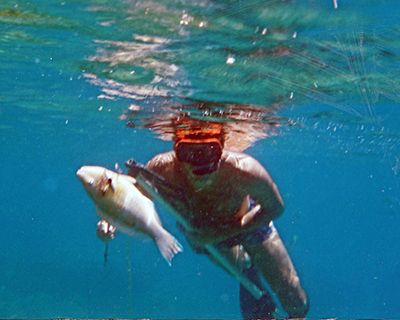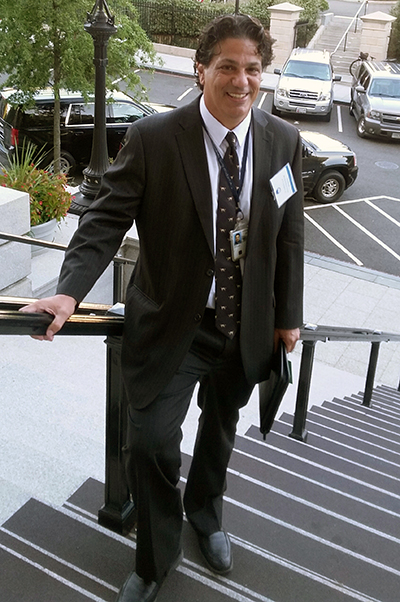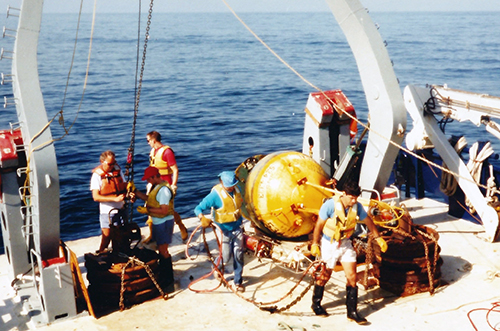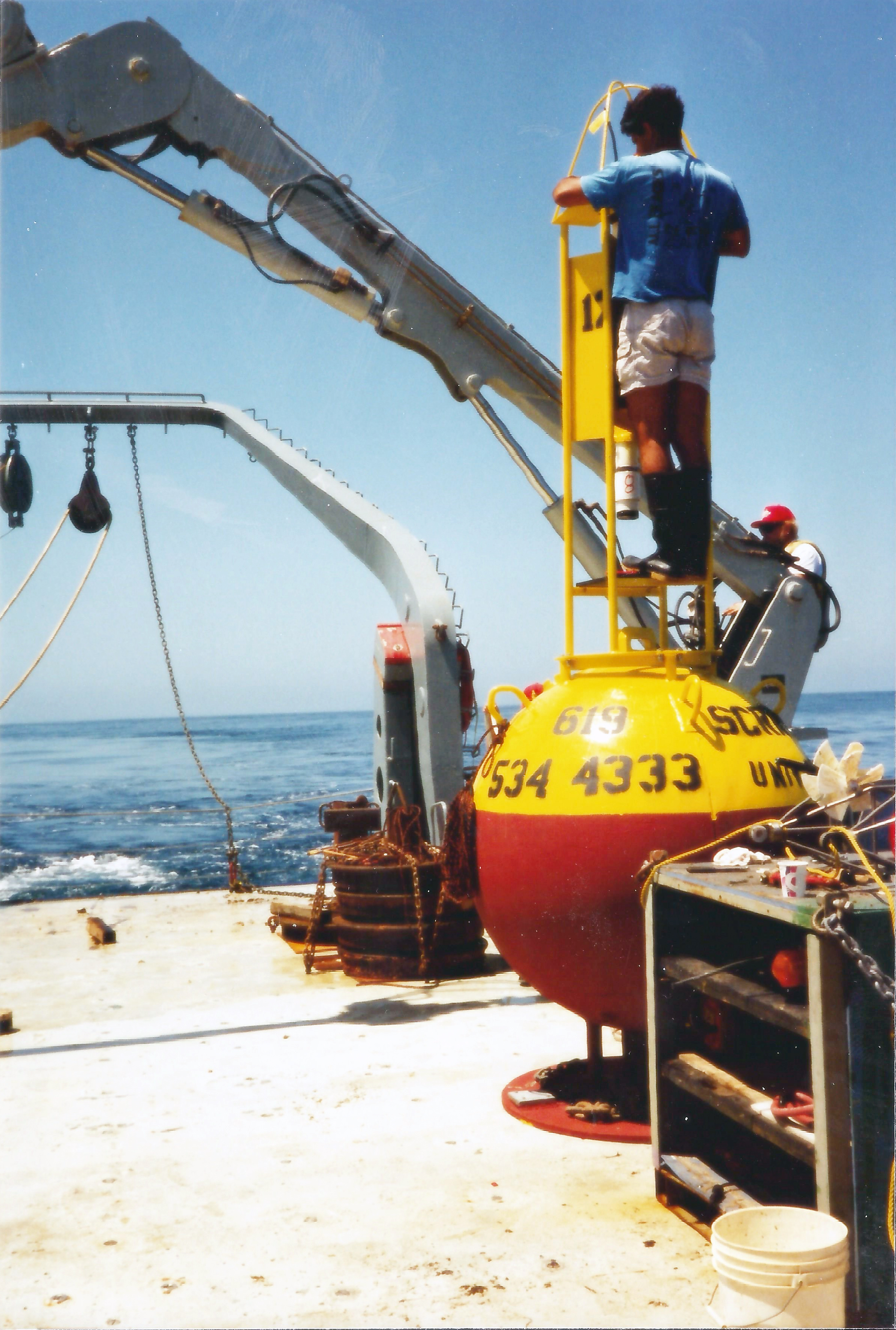For Dr. Guillermo Auad, The Ocean is the Cradle of Life
Growing up, Guillermo Auad never missed a single documentary about the ocean.
 A native of Buenos Aires, Argentina, Dr. Auad, of the Bureau of Ocean Energy Management (BOEM) Environmental Sciences Division, says he grew up as a “natural and dedicated science nerd.” At 14, he decided to become an oceanographer after reading the book, Oceanography by Richard Vetter. At the same time, he was reading books on the theory of relativity, white dwarfs and black holes.
A native of Buenos Aires, Argentina, Dr. Auad, of the Bureau of Ocean Energy Management (BOEM) Environmental Sciences Division, says he grew up as a “natural and dedicated science nerd.” At 14, he decided to become an oceanographer after reading the book, Oceanography by Richard Vetter. At the same time, he was reading books on the theory of relativity, white dwarfs and black holes.
When he was 15, the budding oceanographer was certified as a scuba diver and then licensed as a helmsman at 16. As a teenager, he sailed solo in the estuary of the Rio de la Plata in a small Pampero class sailboat.
During his undergraduate years of college, he studied oceanography from an interdisciplinary perspective but with a focus on physical science at the Buenos Aires Technological Institute. From there, he migrated north to earn his Master of Science degree in physical oceanography at the Center for Scientific Research and Higher Education in Ensenada, Mexico and his PhD at the Scripps Institute of Oceanography. Dr. Auad landed his first position working in the Scripps Climate Research Division. He worked to complement his background as an observational oceanographer with climate modeling. This led to a number of publications on the dynamics and thermodynamics of the North Pacific while learning from renowned oceanographers at Scripps. For more than a decade, Dr. Auad was on the faculty at Scripps where he combined research and teaching at the University of California at San Diego and at Palomar College.
 “The ocean is the cradle of life,” he said. “It also plays a fundamental role in our lives, from climate to health and food security, and ultimately because the ocean symbolically and practically unites all humans sharing the Common Home[1].”
“The ocean is the cradle of life,” he said. “It also plays a fundamental role in our lives, from climate to health and food security, and ultimately because the ocean symbolically and practically unites all humans sharing the Common Home[1].”
When he joined BOEM in June 2010, he started his first day of work on the last day of the former Minerals Management Service and during the Deepwater Horizon crisis that eventually led to BOEM as a newly created federal bureau. Dr. Auad’s roles at BOEM include managing and overseeing research projects, leading the physical oceanography subject matter expert team, and representing DOI at the White House-based Interagency Arctic Research Policy Committee, where he recently wrote a national policy on Arctic marine ecosystems.
“I am very passionate about gaining a holistic knowledge on the different aspects of the oceans,” he said. “This is fundamental because in the classroom we separate its components and drivers. Advancing an integrated knowledge of the oceans is directly linked to our well-being and sustainability.”
He said he is proud of having the experience of working with many great colleagues in the creation and execution of different research projects. For example, the work has led to key findings on the dynamics of the North Pacific Ocean in general, and of the California Current System in particular, both through the analysis of observations and numerical modeling experiments.
Among his proudest accomplishments have been opportunities to work with other scientists to create partnerships in the Gulf of Mexico and the Arctic. He said teaching future scientists and then learning about their progress in their careers is another source of professional fulfillment.
 In his time away from work the oceanographer plays for the Wild Geese, a masters rugby team based in the metro-Washington, D.C. area. The team hosts annual fundraisers to help a remote village in South Africa which lacks basic infrastructure and services on all fronts. Recently, the team partnered with the Rugby Without Borders Foundation (RWB) to foster a peaceful, respectful and solidary encounter of American and Cuban peoples. This past January, they played a game in Havana with American and Cuban players on both teams as well as four diplomats and a U.S. Marine from the U.S. embassy in Havana as guest players.
In his time away from work the oceanographer plays for the Wild Geese, a masters rugby team based in the metro-Washington, D.C. area. The team hosts annual fundraisers to help a remote village in South Africa which lacks basic infrastructure and services on all fronts. Recently, the team partnered with the Rugby Without Borders Foundation (RWB) to foster a peaceful, respectful and solidary encounter of American and Cuban peoples. This past January, they played a game in Havana with American and Cuban players on both teams as well as four diplomats and a U.S. Marine from the U.S. embassy in Havana as guest players.
 “This sent a powerful message that transcended ideologies, politics and current barriers, while humanizing historical perceptions about both nations,” said Dr. Auad. The event was attended by local authorities and received significant media coverage across the Americas and in Europe. Dr. Auad said the highlight of the tour was when one U.S. diplomat referred to the team as "great ambassadors."
“This sent a powerful message that transcended ideologies, politics and current barriers, while humanizing historical perceptions about both nations,” said Dr. Auad. The event was attended by local authorities and received significant media coverage across the Americas and in Europe. Dr. Auad said the highlight of the tour was when one U.S. diplomat referred to the team as "great ambassadors."
He talked about the challenges he faced when he made the decision to join BOEM in 2010. Culture change was a factor.
“Transitioning from academia to government was a big decision that involved personal and professional considerations,” he noted. But looking back, it was a good decision.”
His advice for aspiring ocean scientists is to look for encouragement when faced with what seems to be an obstacle: “If you feel like giving up, just give me a call.”
[1] Pope Francis, 2015. ‘Laudato Si’: On Care for Our Common Home, Encyclical. Vatican Press, The Holly See.

